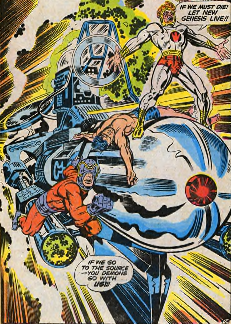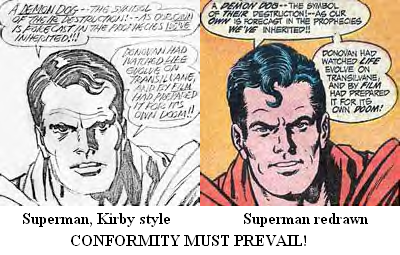I’m looking forward to the imminent release of volume three of the four-volume Fourth World Omnibus, collecting Jack Kirby’s groundbreaking saga of the New Gods. (I’ve already got the first two, and the fourth volume is due out in March.) Kirby loomed large in my childhood comics reading, and his work has an insane energy and inventiveness that manages to redeem the somewhat stilted dialogue. (Despite being a writer and drawer myself, growing up I was oddly unaware of, and unconcerned with, who was writing and drawing the comics I read. But there were a handful of exceptions, folks whose style was too distinctive, too hopelessly individual, not to notice, and Kirby was at the head of that list.) So it’s great to see these works collected – most of which I’ve never read before, as the heyday of Kirby’s Fourth World work was in the early 70s, whereas I didn’t start reading comics until the mid-70s, by which time Kirby had moved on to Kamandi and OMAC.
 What’s the story? Well, there’s a bunch of magic-wielding warriors who fight for peace and justice, and who draw their powers, and guidance, from a mystical energy field called “the Source.” Their chief opponent, Darkseid (pronounced “dark side”), is a towering, dark-clad, dome-helmeted figure who rules a planet that is one huge city; he too draws his powers from the Source, though he seeks to control a twisted “anti-life” version of it. Orion, one of the most powerful leaders of the good guys, turns out to be Darkseid’s son, leading to speculation as to whether he is destined to defeat Darkseid – or instead to succumb to his heritage and turn evil. Yes, all this was pre-Star Wars – leading to endless internet debates as to whether George Lucas was aware of Kirby’s work. (If borrowings there were, they went both ways: in the 80s Kirby returned to the series to have Darkseid use his secret weapon to blow up the good guys’ peaceful planet – and even included the fleeting image of an Imperial Star Destroyer in his depiction of the explosion.)
What’s the story? Well, there’s a bunch of magic-wielding warriors who fight for peace and justice, and who draw their powers, and guidance, from a mystical energy field called “the Source.” Their chief opponent, Darkseid (pronounced “dark side”), is a towering, dark-clad, dome-helmeted figure who rules a planet that is one huge city; he too draws his powers from the Source, though he seeks to control a twisted “anti-life” version of it. Orion, one of the most powerful leaders of the good guys, turns out to be Darkseid’s son, leading to speculation as to whether he is destined to defeat Darkseid – or instead to succumb to his heritage and turn evil. Yes, all this was pre-Star Wars – leading to endless internet debates as to whether George Lucas was aware of Kirby’s work. (If borrowings there were, they went both ways: in the 80s Kirby returned to the series to have Darkseid use his secret weapon to blow up the good guys’ peaceful planet – and even included the fleeting image of an Imperial Star Destroyer in his depiction of the explosion.)
Anyway apropos of all this, a couple of comments:
1. The fourth volume is apparently going to end with Kirby’s 1985 Hunger Dogs – which I gather means that Kirby’s New-Gods-related work on the Super Powers series is going to be left out. If so, I can understand that decision, since Kirby’s involvement in Super Powers was complicated (see below); still, it’s unfortunate that that work isn’t going to be collected.
 The Super Powers comic books are largely forgotten today. (For example, Wikipedia wrongly claims – as of this writing – that the superhero “Golden Pharaoh” was “created exclusively for the Super Powers Collection line of action figures” and “never appeared in any comic books.”) Super Powers consists in three identically titled limited series: a five-issue series in 1984, a six-issue series in 1985, and a four-issue series in 1986. The stories, which pit Darkseid and his minions against the Justice League, lie outside mainline DC continuity. For one thing, they accept the events of Hunger Dogs, including the destruction of New Genesis and the overthrow of Darkseid’s rule on Apokolips – events that in current DC continuity never happened. (These event seem to take place between the first and second series.) For another, the Justice League is referred to as the “Super Powers Team” (remember that toy tie-in) and its headquarters looks like the one in the tv series Super Friends (also part of the tie-in).
The Super Powers comic books are largely forgotten today. (For example, Wikipedia wrongly claims – as of this writing – that the superhero “Golden Pharaoh” was “created exclusively for the Super Powers Collection line of action figures” and “never appeared in any comic books.”) Super Powers consists in three identically titled limited series: a five-issue series in 1984, a six-issue series in 1985, and a four-issue series in 1986. The stories, which pit Darkseid and his minions against the Justice League, lie outside mainline DC continuity. For one thing, they accept the events of Hunger Dogs, including the destruction of New Genesis and the overthrow of Darkseid’s rule on Apokolips – events that in current DC continuity never happened. (These event seem to take place between the first and second series.) For another, the Justice League is referred to as the “Super Powers Team” (remember that toy tie-in) and its headquarters looks like the one in the tv series Super Friends (also part of the tie-in).
I suspect Kirby was unhappy about having to conform to a product tie-in. In any case, Darkseid’s ranting, in the contemporaneous (but far superior) Hunger Dogs, against the ignoble nature of the “Micro-Mark” device, the “fearsome pygmy” on which he is forced to rely, sounds a lot like an artist complaining about a line of action figures based on his work. When the device’s makers describe it as “light, compact, and inexpensive to assemble,“ and assure Darkseid: “We’re turning them out by the thousands! Cheap, sire! … A new age is dawning, sire! … Have I not turned his awesome talent to child’s play!? I’ve conquered the impossible, sire! – for the price of a small coin!” Darkseid replies: “You blind ‘tinkertoy’ promoters of mediocrity! … Don’t say anything more! If you make any reference to packaging …. You expect me to sanction this … this filth? … You’ve ‘ripped-off’ the anti-life equation!” But the makers of the Micro-Mark continue to insist that the “unchanged wizardry” on which a “poor, shabby old relic” might rely has been “made obsolete by simple toys! … This is Micro-Mark’s hour! There’s no need for intrigue or great strivings – the cosmos lies open to button-pushing babes! … For what is power now but cheap techno-plumbing[?]” Sounds like Kirby’s got an issue about something ….
But what’s Super Powers about? Well, both Darkseid (whose planet has rebelled and exiled him) and the New Gods crowd (whose planet has exploded) are looking for a home base; the New Gods are trying to remake the newly liberated Apokolips in the image of New Genesis (the new homeworld introduced at the end of Hunger Dogs has evidently been forgotten), while Darkseid’s aim is either to conquer Earth and make it into a new Apokolips, or else to reconquer the original Apokolips (or both). He tries again and again, but the Justice League keeps stopping him, usually with the help of Orion or Metron or Mister Miracle. The third series ends on a semi-cliffhanger (Darkseid has disguised himself as a superhero and has insinuated himself into the Apokolips reconstruction project, while at the same time attracting Wonder Woman’s romantic interest); as far as I know this dangling plot thread was never resolved.
 What’s Kirby’s involvement? With the third series (which incidentally features inter alia the aforementioned totally lame Golden Pharaoh character, who draws his powers from anything pyramid-shaped, and talks the way British people were once imagined to talk), none at all – it’s written and drawn entirely by other people. (So you can’t blame the Golden Pharaoh on Kirby.) But Kirby did the art (though not the writing) for the second series (see the accompanying pic, portraying a defeated Darkseid escaping through the sewers of Armagetto). For the first four issues of the first series, he did plotting but not writing, and cover artwork but not interior artwork. For issue #5 of the first series, however, Kirby wrote and drew the whole thing.
What’s Kirby’s involvement? With the third series (which incidentally features inter alia the aforementioned totally lame Golden Pharaoh character, who draws his powers from anything pyramid-shaped, and talks the way British people were once imagined to talk), none at all – it’s written and drawn entirely by other people. (So you can’t blame the Golden Pharaoh on Kirby.) But Kirby did the art (though not the writing) for the second series (see the accompanying pic, portraying a defeated Darkseid escaping through the sewers of Armagetto). For the first four issues of the first series, he did plotting but not writing, and cover artwork but not interior artwork. For issue #5 of the first series, however, Kirby wrote and drew the whole thing.
I can see how all this poses a problem for the compilers of the Omnibus. If they included the first two series, they’d be including a lot of material written and/or drawn by people other than Kirby, which would arguably defeat the point of the collection. If instead they included only issue #5 of the first series – the one issue written and drawn entirely by Kirby – readers would be presented with a conclusion without seeing what it was a conclusion to. And in any case the Super Powers material just isn’t as good as most of the Fourth World stuff. So I can see why they threw up their hands and left it all out entirely. Still, the regrettable result is that there’s a substantial amount of New-Gods-related material written and/or drawn and/or plotted by Kirby that won’t be making it into the omnibus. Come on, guys; give us a separate Super Powers collection.
Incidentally, one advantage of the second Super Powers series is that we finally get an unfiltered look at Kirby’s vision of Superman – by contrast with the original Fourth World comics, where Kirby’s pencils of Superman were always redrawn in “DC house style”:

2. In what seems like an odd way of marking the release of the Kirby Omnibus, DC Comics is currently killing all the Fourth World characters off, in a series called Death of the New Gods (though a number of them were already killed off in other series shortly before). I’m not sure why they want to get rid of these characters and anyway the “someone is systematically bumping off superheroes” plot has been done better before, in comics like Watchmen and Rising Stars. The deaths thus far seem pretty pointless; it’s like watching Tasha Yar get killed the same way over and over again.
Now I’m no great fan of Obama – who’s not the peace candidate he pretends to be – but how refreshing it is to see a candidate not going along with the flag-worship that prevails so tiresomely throughout this country!